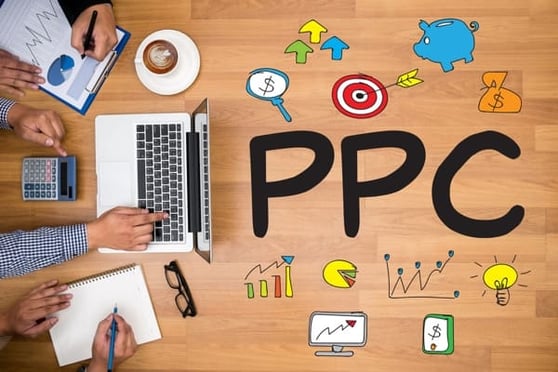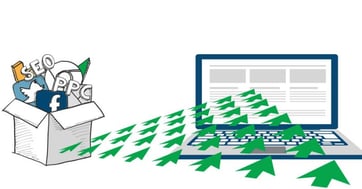Editor's Note: This post was originally published in February 2014 and was updated with additional information in September 2023.
In an earlier blog post, we discussed how PPC complexities often lead to partially wasted campaign budgets. And while that fact remains true, there are some underrated ways you can use paid search to enhance other areas of your digital marketing efforts. Content and paid social media, for example, are two areas where non-traditional pay-per-click methods can go a long way toward boosting your overall Google Ads campaign results.
So, what do we mean by 'non-traditional PPC methods'? Well, most people who don't know much about PPC beyond that it stands for pay-per-click advertising usually assume it runs exclusively through Google. But the truth is there are other ways to integrate PPC with your marketing tactics, and in some cases, you can even feel comfortable implementing these methods yourself. That's not to say traditional Google AdWords PPC campaigns aren't worth it, as they can improve your marketing in more ways than one. In fact, the suggestions we're about to make will actually help you develop a further understanding of the inner workings of PPC, no matter the scale or platform.
Let's get to it, shall we? Here are three relatively simple and underrated PPC-related tactics you can use to get an edge on your competitors:
1. Use Google's Keyword Planner (But Not How You Think)
Okay, I admit, it's a little funny that I'm leading off with Google after I just finished saying we were going to think outside the Google box. You can point and laugh now. But bear with me because we are going to think outside the box by using a PPC tool to generate ideas in an unorthodox way. I recently came across a genius article by Dan Shure where he discussed how to use the landing page function of the Google Keyword Planner to brainstorm for keywords. The whole piece has more granular details on all the awesome things you can do to exploit various landing pages, but I'll just show you the basics.
So, start with the Keyword Planner and search for new specific keywords or PPC ad group ideas. Let's say that you have a movie review website that you want to get up and running. First, let's see the results from a big industry site's landing page:
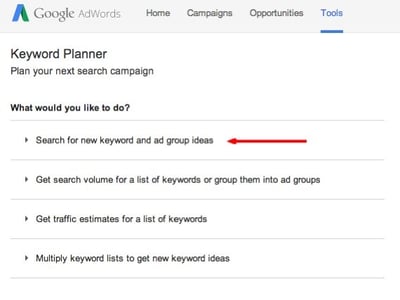
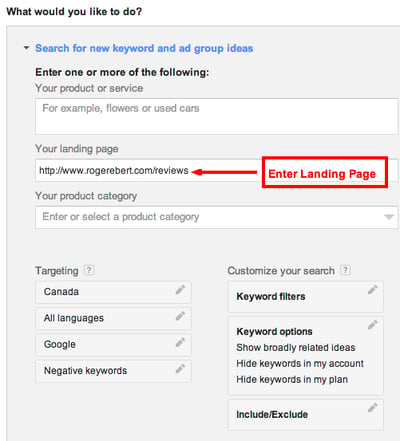
The tool is intended to help you discover the words and phrases that you should use in Google Ads that land on the page I've entered. So, I expect that Google will understand that the page indicated is about movies.
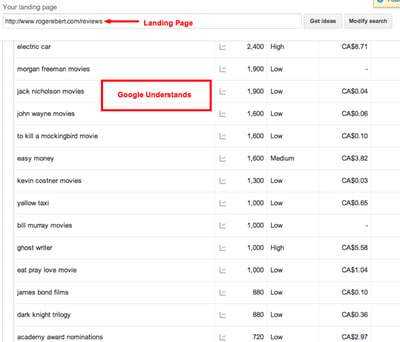
This is exactly what happened, so we know Google understands. Just by entering a landing page of a competitor's site, we've already generated some content ideas. And remember, these ideas aren't necessarily for PPC advertising keywords (although they could be). We're primarily looking for content ideas, things to write about that people are interested in and searching for but don't have high competition (at least in AdWords - don't forget where the data is coming from). For example, Kevin Costner has a new movie coming out, and he could be trending this month, so an article focused on 'Kevin Costner movies' could do well.
You can also do much more with the landing page function, including things like entering a Wikipedia page for an industry term.
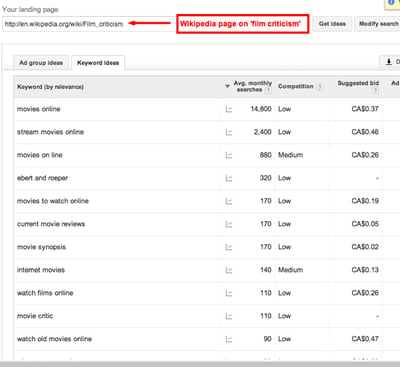
The above search was also filtered with the negative keywords 'free', 'stream', and 'watch', which were all part of the highest searched phrases. But given that a movie review site is entirely informational, it might not even be a bad idea to generate a link-bait article about "Streaming Movies Online". Other ideas stemming from this list include an in-depth piece on Ebert & Roeper and a page or section on 'current movie reviews.'
Again, these basic examples highlight some new ways people are using the Keyword Planner to generate fresh ideas. The best way to take advantage is to go and experiment with it yourself!
2. Experiment With Facebook Ads
Facebook ads work. Facebook ads are cheap. If you're doing any kind of content marketing and social outreach, you really need to at least discover whether Facebook ads can help promote your stuff and increase brand awareness. The minimum spend for Facebook ads is $1 per day, and the cost per 1,000 impressions is incredibly low. Next time you write some excellent content, set up a Facebook ad and see what happens. It's easy!
Choose the purpose of your ad (in this case, to get more clicks through to the article we decided to write on the ten best Kevin Costner movies of all time):
Upload an image, choose your headlines, and target your ad based on demographics and interests:
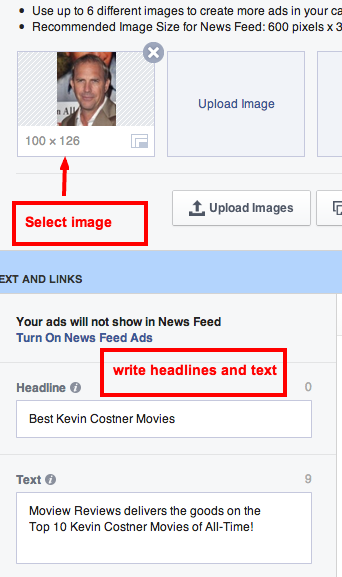
Pretty easy, right? That's pretty much it, and you've got a simple, targeted ad that's going to get extra eyes on your content for next to nothing. Even if you spend $1 a day for a week, it'll be worth the results. And don't tell me you can't handle $7 for a few Facebook ads! Give it a shot; you might be surprised by the results (which you should, of course, track).

3. Test Twitter Ads
Now that you've given Facebook ads a try don't stop there! Keep the PPC ball rolling and give Twitter ads a chance. Twitter is a relative newcomer to the ad scene, but in limited testing, we've experienced success on the platform. The problem with Twitter for most people is that it moves too quickly. You might post once or twice a day and wonder why you never generate any engagement; the truth is, even if you've got 100 or 200 followers, hardly anybody is going to notice your once-a-day tweeting. With a minimal budget, you can use Twitter ads to boost outreach and engagement, which will get you started in the right direction.
Like Facebook, Twitter ads are pretty cheap and easy to set up. So, in addition to the Facebook ad you're running for the Kevin Costner piece, you could also run a short Twitter ad campaign to increase awareness. It could be as little as $10 for one day just to boost initial outreach:
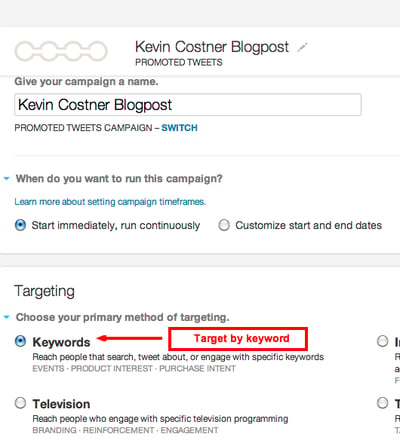
Choose target keywords to reach people who search, tweet about, or engage with your selected phrases. Also, choose location targets and where you'd like the ad to appear (in users' timelines or just search results):
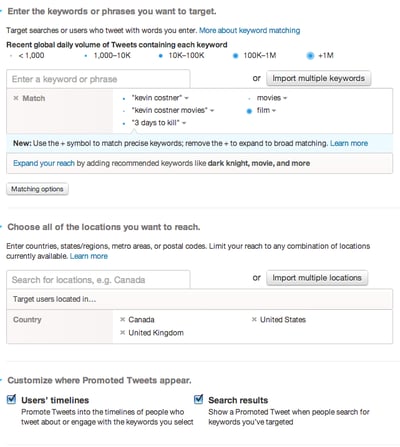
Finally, you can set your budget and bid levels and test away. You can even choose to promote different tweets (which are really ads), so choose your words wisely:
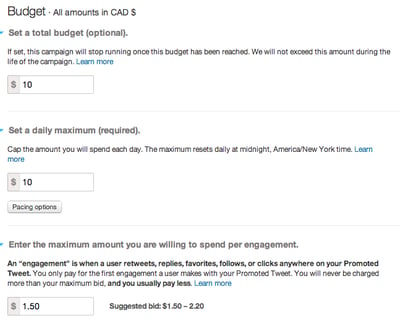
Key Takeaways
When it comes to managing your PPC campaigns, it's essential to consider these often underrated actionable PPC tips and tricks to improve the performance of your marketing efforts. These strategies can be the game-changer you've been searching for.
PPC performance is a crucial metric in the digital marketing landscape. Your campaign performance directly affects the success of your online advertising endeavors. By implementing these tactics, you have the opportunity to see significant improvements in the performance of your PPC campaigns.
One of the key takeaways from these tips is that experimentation is key. You won't know whether these strategies can truly boost your PPC performance until you try them out. In fact, it's not uncommon for digital marketers to be pleasantly surprised by the results.
For example, if you've been struggling with high click-through rates (CTR) but low conversion rates, trying out different ad copy variations or adjusting your targeting settings might make a substantial difference in the performance of your PPC campaigns. These small tweaks can lead to a more efficient use of your advertising budget and ultimately improve the ROI of your campaigns.
Don't forget that managing your PPC campaigns effectively requires ongoing attention. It's not a set-it-and-forget-it task. Regularly monitoring and optimizing your campaigns using these actionable tips and tricks will contribute to long-term success.
AI can help you with a variety of tasks, such as:
- Automating bidding: AI can be used to automate bidding on keywords, which can save you time and money. AI-powered bidding algorithms can take into account a variety of factors, such as competition, budget, and conversion rates, to determine the optimal bid for each keyword.
- Targeting personalization: AI can be used to tailor advertising, which can enhance relevance and boost click-through rates. User demographics, interests, and search history are just a few of the variables that AI-powered targeting algorithms can take into account to deliver ads that are more likely to be seen and clicked on by the right people.
- Improving ad copy: AI can be used to improve ad copy, which can help increase click-through rates and conversions. AI-powered copywriting tools can analyze past ad performance and generate new ad copy that is more likely to be effective.
- Predictive analytics: AI can be used to do predictive analytics, which can help you make better decisions about your campaigns. AI-powered predictive analytics tools can analyze historical data to predict future performance, identify trends, and uncover opportunities.
However, it is important to note that AI is not a magic bullet. It can be a powerful tool, but it is still important to have a good understanding of PPC and how to use it effectively. You should also be aware of the limitations of AI, such as the fact that it can sometimes make mistakes.
If you are considering using AI to run your PPC campaign, I recommend that you start by doing some research and learning more about the different AI-powered tools and services that are available. You should also talk to a PPC expert who can help you develop a plan for using AI in your campaigns.
Here are some of the AI-powered tools and services that you can use to run your PPC campaign effectively:
- Google Ads AI Bidding: This tool uses machine learning to automatically set bids for your keywords, so you can focus on other aspects of your campaign.
- Amazon Attribution: This tool helps you track the effectiveness of your PPC campaigns across Amazon and other channels.
- Facebook Ads Conversion API: This API allows you to track conversions from your Facebook ads, so you can optimize your campaigns for better results.
- LinkedIn Campaign Insights: This tool provides insights into the performance of your LinkedIn ads, so you can make informed decisions about your campaigns.
- Twitter Ads Analytics: This tool provides insights into the performance of your Twitter ads, so you can make informed decisions about your campaigns.
These are just a few of the many AI-powered tools and services that are available. By using these tools and services, you can automate tasks, personalize targeting, improve ad copy, and make better decisions about your campaigns. This can help you run your PPC campaigns more effectively and achieve your business goals.
In conclusion, if you're looking to improve the performance of your PPC campaigns and get more out of your advertising budget, don't hesitate to implement these often underrated tactics. Remember, you won't know their true impact until you try them. So, give them a shot and see how they can positively influence your PPC performance and overall campaign performance. At worst, you'll have spent a small amount to get your answer, but we believe you'll be pleasantly surprised by the results.

